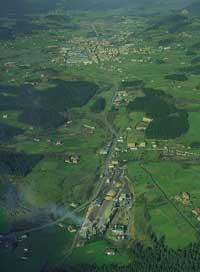General environmental protection law of the Basque Country and its impact on industry

On 27 February, the Basque Parliament approved the General Law on Environmental Protection, which regulates the main aspects related to environmental protection. This law is the result of debate and debate among different sectors of society, which has taken many years to configure and develop. In fact, the bill has been dancing since 1995 in the hands of the Basque Government's Interdepartmental Commission on the Environment. In any case, this has not been the only one that has been debated, since in the last legislature another different draft was debated that later was suspended.
The approved standard mandates competences between the different administrations. In addition, it establishes a series of procedures for the management of potentially environmental activities and establishes the inspection and control mechanisms of the Administration. The law affects most of the industrial sectors and economic activities of the Autonomous Community of the Basque Country, which means that any industrial activity that wants to be launched must first pass through the sieve of the law.
Some contents of the law
The law consists of 118 articles. Some of them fully affect industrial activities, others focus on other areas, contributing almost always interesting. In which they guarantee mechanisms of participation and control of citizens, for example, the right of access to information and public initiative (any citizen has the right to demand the provisions of the environmental standard), and the constitution of the Environmental Advisory Council (formed by the participation of civil society).
The fifth article, for its part, regulates both public and private environmental policy instruments, such as the creation of funding funds for environmental protection activities, a fiscal policy that encourages environmental improvements, the implementation of eco-taxes, very well perceived by environmentalists and more critical sectors.
Another highlight is the special development of impact assessment systems, included in the third title of the law. It mentions three different procedures that apply to plans, large projects and small projects, respectively. The application of impact assessment to projects and plans is an excellent innovation, although, as usual, it also has its limitations, since only some types of plans are obliged to do so.
Industry can soon have something to do
Among those aimed at the industry is the article on environmental inspection. It mentions the need for different administrations to promote environmental inspections so that all companies comply adequately with environmental legislation and reduce environmental pollution.

While Article 39 on integrated pollution control is of low development, it will shortly be decisive for some industries. This aims to avoid or at least reduce emissions to the atmosphere, water and soil. Waste measures would also be integrated into the system, managing everything together.
In the area of authorizations there is also a need to coordinate the administrative procedures necessary for obtaining licenses and permits. Unfortunately, the law only includes the commitment to promote it, being about to see when and how its execution will occur.
Unable to solve the usual competition darkness
Despite the significant improvements in the competition distribution of the Law, it has received numerous criticisms for not fully resolving the existing competition and organizational confusion in environmental matters. It is true that, on the one hand, the horizontal division of responsibilities between the different departments of the Basque Government does not break and, on the other hand, in some areas, especially the aquatic, does not address the res de la res and the previous dark situation remains. The Provincial Councils, for their part, continue with their powers and in some cases remain
It is also widespread, for example, in environmental impact. However, the problem is not that of the Environmental Law, but that of the specific institutional organization of the Autonomous Community of the Basque Country, which for the moment is irreparable.





